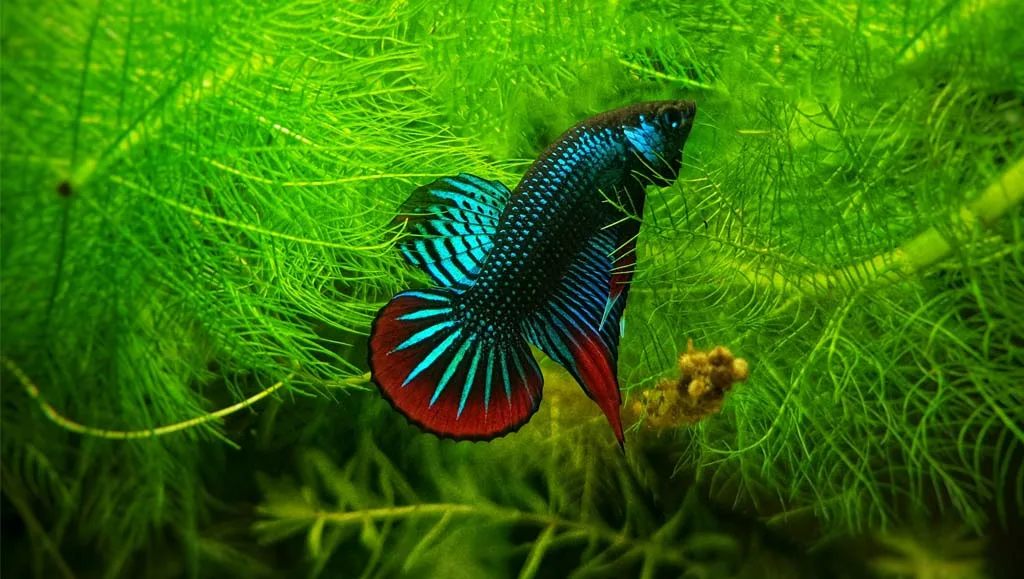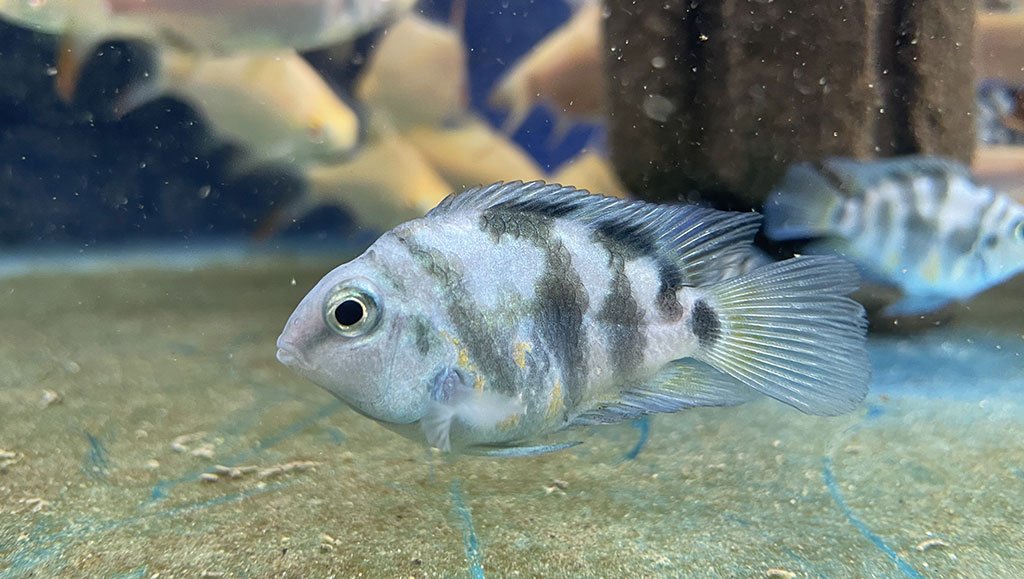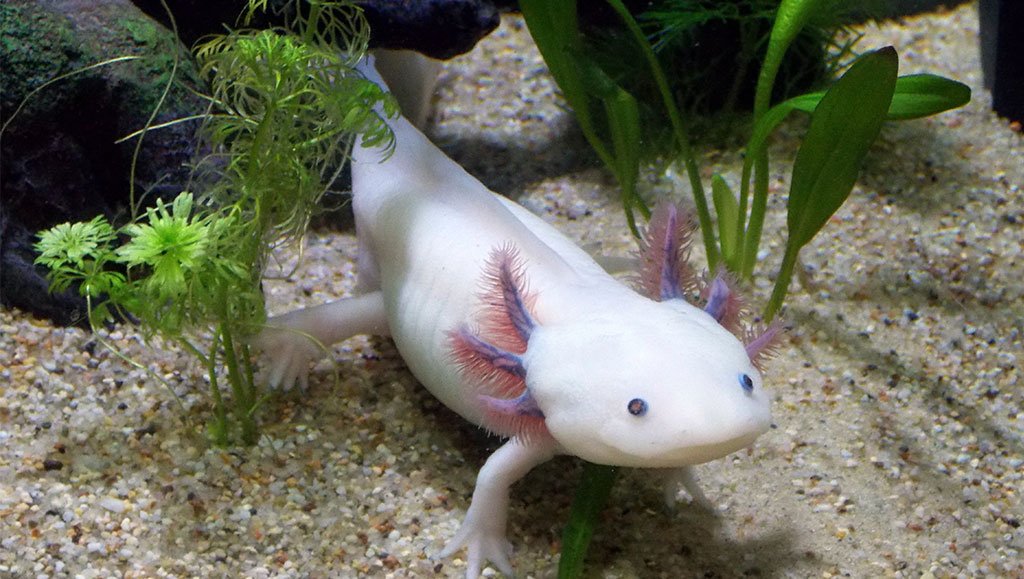For betta fish enthusiasts, the internet is awash with conflicting information about the duration their beloved aquatic companions can last without food. In this comprehensive exploration, we’re feeding your curiosity with the facts about betta feeding behavior and busting the myths that have been floating around for too long.
As aquarists, one of our primary responsibilities is ensuring that our fish are well-fed. But with bettas, we often ask one question, how long can a betta fish live without food? The answer is finding the right balance is key, and every feeding decision you make can have significant consequences for your fish’s health and longevity. We’ll go more into the variables that affect how long a betta fish can survive without food in this post.
Natural Feeding Behavior of Betta Fish
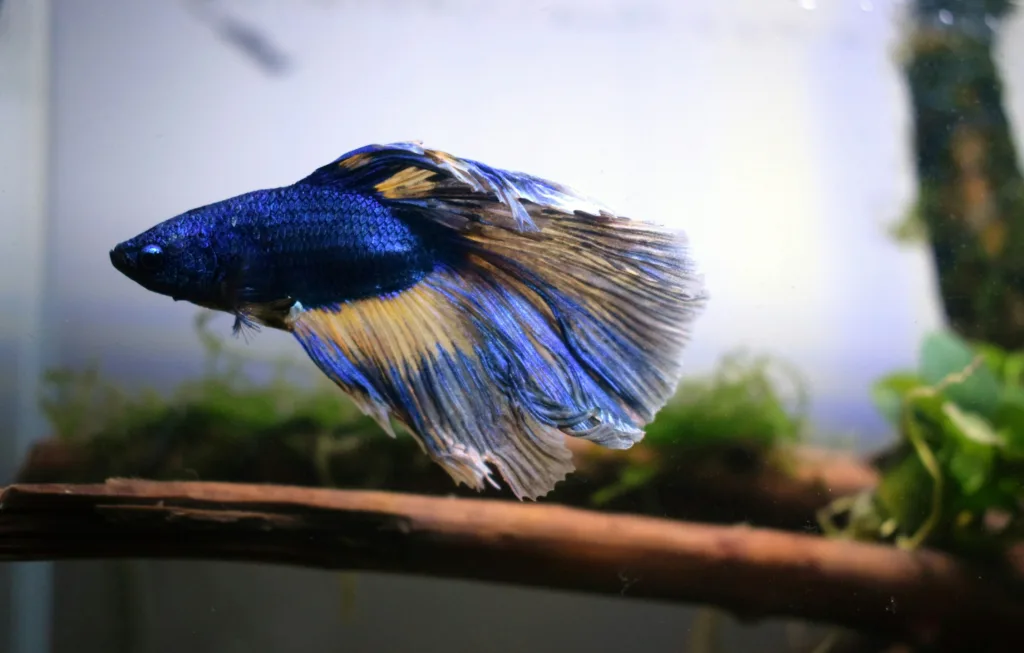
Understanding Betta Fish’s Feeding Instincts in the Wild
The ancestral environment of the betta fish is quite the opposite of the food-plenty that many live in today. In the wild, bettas dwell in shallow waters, such as rice paddies, where food sources can be meager.
These conditions have shaped the betta fish’s feeding behavior to be opportunistic. They have evolved to feast during times when food is abundant, like during the rainy season when insects are plentiful, and to survive periods of scarcity by relying on their internal reserves. This adaptability is a crucial survival mechanism in their native habitat, allowing them to endure fluctuating food availability.
Frequency of Feeding in Natural Habitats
Betta fish will typically feed opportunistically, consuming whatever they can find — often small insects and larvae that fall into their watery homes. They do not have a set feeding schedule and may go some days without a substantial meal.
This behavior is common, especially during the dry season when food sources are scarce. However, when a meal is available, bettas will consume as much as they can to store energy for times of scarcity.
How long can a betta fish live without food?
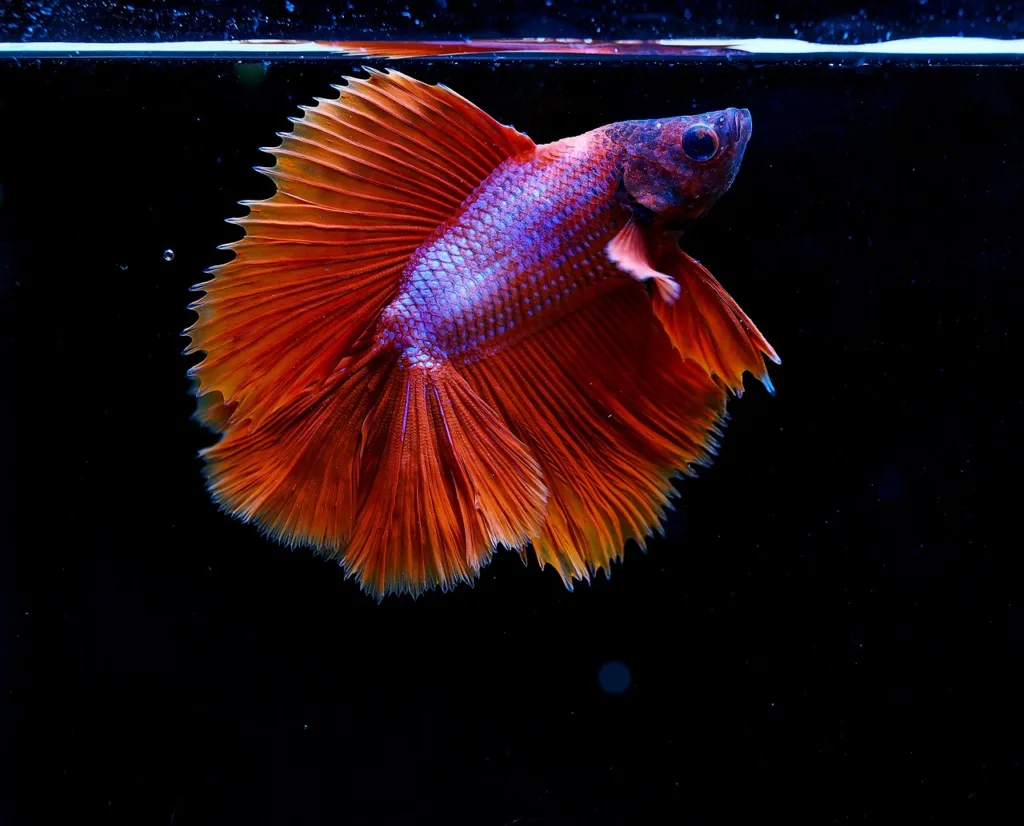
Understanding the Factors Affecting Survival Time
To understand better how long can a betta fish live without food. We need to know that Betta fish can withstand long periods without food, but several factors influence how long they can go without eating. These include:
- Physiological Condition: Betta fish in good health and with ample energy reserves are more likely to survive extended periods without food. On the other hand, those with underlying health issues may struggle to endure extended periods of food scarcity.
- Temperature: A betta fish’s metabolism is directly affected by temperature. The higher the water temperature, the faster their metabolic rate. This means that in warmer tanks, bettas will require more frequent feeding to sustain their energy levels.
- Tank Size: Ammonia levels in smaller tanks can rise quickly, which can cause the fish to get stressed and the water to become poor quality. This can significantly impact a betta’s ability to survive without food, as they are more susceptible to disease and illness in these conditions.
- Stress Levels: Stress is detrimental to a betta fish’s health, particularly when it comes to their feeding behavior. If they are stressed due to overcrowding, tank aggression or poor water conditions, they may refuse to eat for extended periods, leading to malnutrition and a weakened immune system.
The Myth of Feeding Betta Fish Every Day
One common myth about betta fish feeding is that they need to be fed every day. This is not true; in fact, overfeeding your betta can have adverse effects on their health. As opportunistic feeders, bettas are accustomed to irregular feeding schedules and can go for several days without food.
However, this does not mean you should neglect your betta’s feeding needs. A well-fed betta is a healthy betta, so it’s crucial to find the right balance between feeding frequency and portion size.
Impact on Life Span
In the wild, the average lifespan of a betta fish is around 2-3 years. This may seem short compared to other tropical fish that can live up to 10 years or more. But this shorter life span is not solely due to food scarcity; other factors such as predation, disease, and environmental changes also play a significant role.
When given the right care and diet, betta fish can survive for up to five years or more in captivity. However, overfeeding and poor water quality can significantly decrease their lifespan.
Feeding Habits in Captivity
When bettas are kept in captivity, their natural feeding instincts take a backseat as they become reliant on their human caretakers for food. Often, this leads to overfeeding and obesity, which can significantly impact their lifespan.
It’s essential to understand that in a well-maintained aquarium, betta fish can survive for up to two weeks without food. However, this should not be seen as an excuse to skip feeding them regularly. They must eat a balanced, healthful diet to maintain good overall health and wellbeing.
Adaptations to Fasting Periods
This inherent ability to adapt to varying periods of food availability is mirrored in their physiology. Betta fish are equipped with a labyrinth organ, a unique anatomical feature that allows them to breathe atmospheric air and survive in low-oxygen environments. This adaptation not only aids in survival in stagnant waters but also supports their ability to withstand fasting periods by mitigating the energy spent on sustaining high metabolic rates. During fasting, bettas can lower their metabolic rate, conserving energy and relying on their fat reserves until food becomes available again. This evolutionary trait underscores their resilience and has direct implications for betta care in aquarium settings.
Adaptations for Surviving Periods of Food Scarcity
Bettas have evolved to cope with these occasional hunger spells. They have a labyrinthine organ allowing them to breathe air from the water’s surface, which can sustain them in environments where oxygen levels are low due to a lack of movement and feeding.
Additionally, bettas can slow down their metabolism and conserve energy during fasting periods by relying on their fat reserves. This not only helps them survive but also allows them to redirect energy towards growth and reproduction once food becomes available again.
Factors Affecting how long can a betta fish live without food
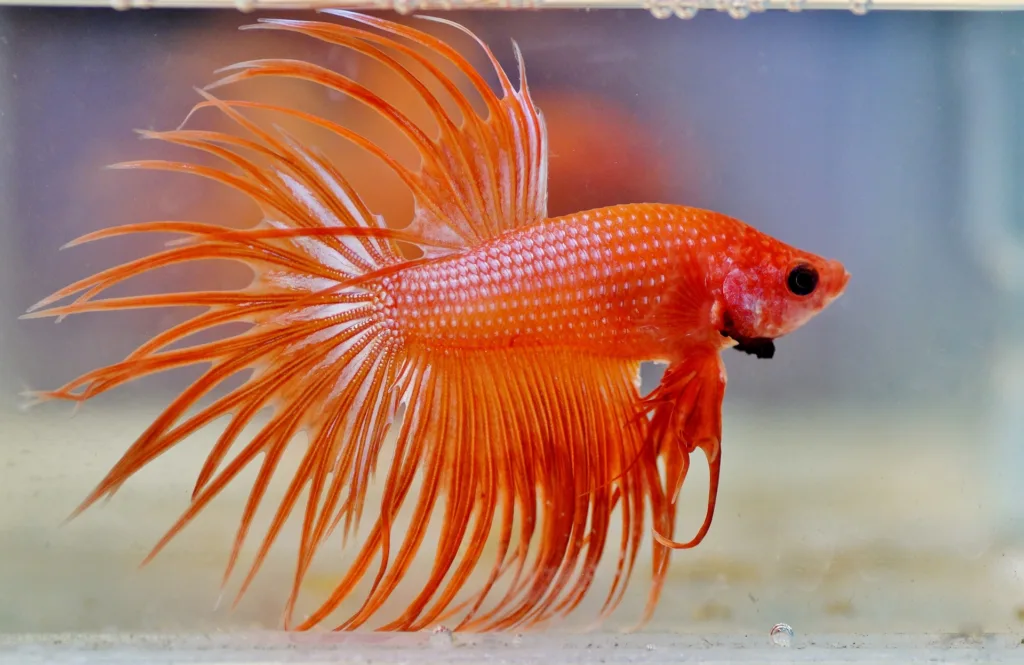
Bettas’ ability to withstand periods without eating is not limitless and varies depending on several internal and external factors.
Age and Health of the Betta Fish
Younger, more energetic bettas can usually survive longer than their elderly counterparts. Similarly, bettas that are in good health and physical condition will have greater resilience. Preexisting health conditions, such as infections or parasites, can weaken a betta’s immune system and make them more susceptible to starvation.
Tank Conditions
As mentioned earlier, factors such as tank size and water temperature can significantly impact how long a betta fish can go without food. In smaller tanks with poor water quality, bettas may succumb to illness quicker due to higher ammonia levels and stress, reducing their ability to survive without food.
Individual Differences
Not all bettas are the same; each fish has its own unique metabolism, resilience, and adaptability. Some may be able to withstand longer periods without eating compared to others, depending on various factors such as genetics and upbringing.
Tank Conditions and Water Temperature
The state of the aquarium, including water quality and temperature, can affect a betta’s metabolism and energy expenditure. Clean, warm water can help them maintain better health during fasting periods.
Previous Feeding Schedule and Nutritional Status
A betta that has been fed a nutritious diet regularly will have adequate energy stores to survive without further feeding for a longer time. Conversely, a malnourished betta will have less of a buffer.
Typical Duration Betta Fish Can Survive Without Food
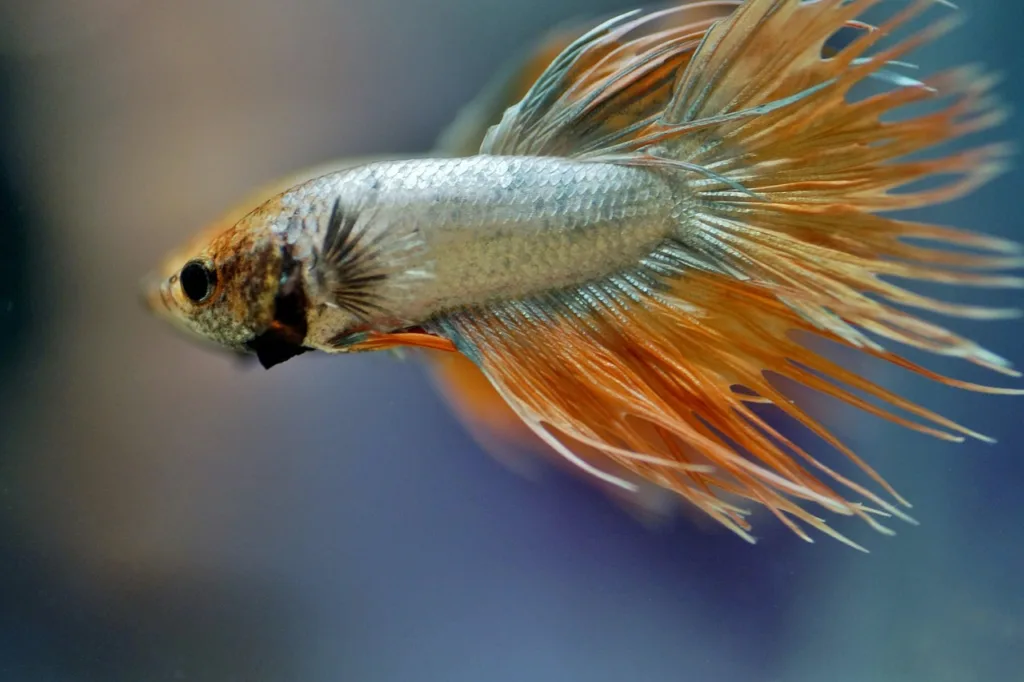
General Guidelines for Betta Fish Feeding Frequency
Many aquarists follow a feeding schedule of once or twice a day. However, this can be adjusted based on individual betta needs and takes into account occasional fasting days.
Common Misconceptions about Betta Fish Feeding Habits
Misinformation about betta feeding can lead to overfeeding, which is just as harmful as underfeeding. Bettas have a tiny stomach and can only eat what they can consume in a few minutes at each feeding. Feeding them daily is part of a healthy routine, but flexibility is key.
Realistic Expectations for Extended Periods Without Food
While bettas are capable of surviving without food for several weeks, it’s crucial to understand that this is far from ideal. Prolonged fasting can weaken the immune system and make the betta more susceptible to disease.
Signs of Hunger or Malnutrition in Betta Fish
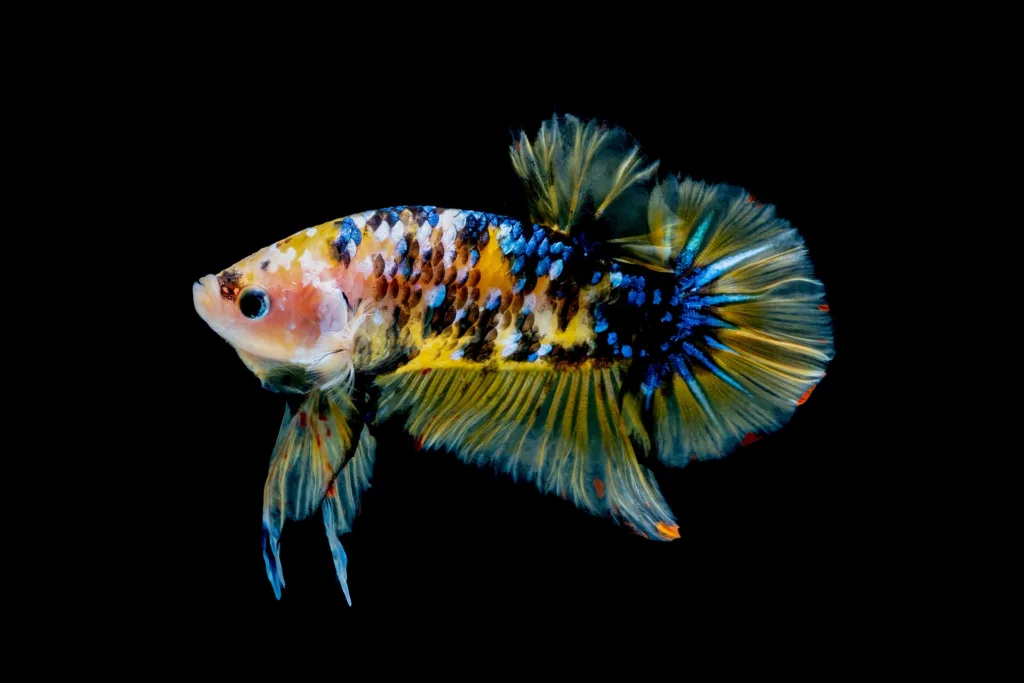
Behavioral Changes Indicating Hunger
If your betta is hungry, it may become lethargic or rest at the bottom of the tank, seeking out less movement to conserve energy. You may also notice them actively searching for food, displaying aggressive behavior towards tank mates or flaring their fins.
Physical Signs of Malnutrition
Malnourished bettas may exhibit physical signs such as weight loss, a sunken or emaciated appearance, and a dull coloration. Changes in fin shape and tail deterioration are also common indicators of malnutrition.
Importance of Monitoring Betta Fish’s Health and Well-being
Regular observation of your betta’s behavior and appearance can clue you into whether they’re getting the nutrition they need. The best prevention for malnutrition is attentive care. They will remain healthy and lively if you keep their tank clean and feed them a balanced food.
Tips for Managing Betta Fish Feeding Schedule
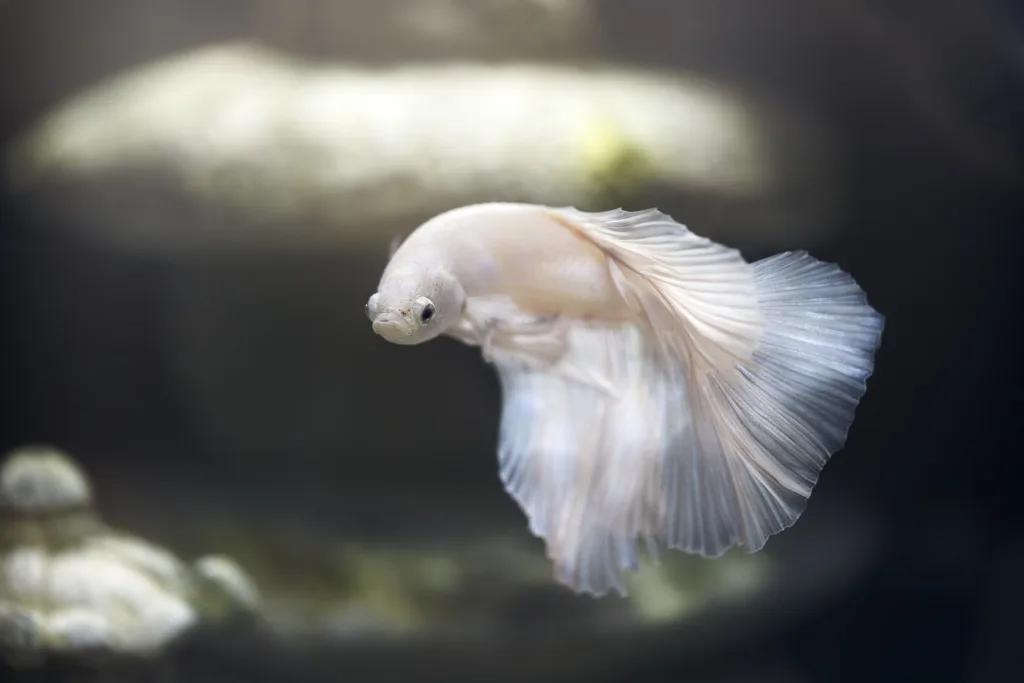
Establishing a Consistent Feeding Routine
Routine feeding time is beneficial for bettas and can help avoid overfeeding. Consistency can also allow you to better monitor the fish’s appetite and engagement with their food.
Adjusting Feeding Frequency and Quantity
Understanding your betta’s specific needs can help you optimize their feeding schedule and quantity. It’s important to adjust the amount of food based on the betta’s size, activity level, and water temperature. In cooler temperatures, bettas may require less food as their metabolism slows down. Conversely, in warmer water, their metabolic rate increases, necessitating more frequent feeding. Observing how your betta responds to feeding can guide you in making the necessary adjustments to ensure they receive the right amount of nutrition.
Choosing the Right Type of Food
Bettas are carnivorous by nature, requiring a diet rich in protein. Offering a variety of foods, such as high-quality pellets designed for bettas, frozen or live foods like brine shrimp and bloodworms, can help meet their nutritional needs and mimic their natural diet. It’s crucial to select foods that are specifically formulated for bettas to ensure they contain the appropriate nutrients, promoting a healthy immune system and vibrant coloration. Avoid overreliance on one type of food to prevent nutritional deficiencies and maintain your betta’s interest in eating.
Proper Portion Control to Avoid Overfeeding
A few small pellets or a pinch of flakes is all your betta needs at each feeding. Any uneaten food can quickly degrade the water quality, so it’s important to remove any excess after a few minutes.
Planning Ahead for Times When You’re Away
In cases where you must be away from your betta for a while, it’s crucial to prepare. Overfeed slightly before you leave and ensure someone can take over feeding while you’re gone if the period is extended.
Importance of Maintaining Betta Fish Health
It’s crucial to ensure the overall well-being of your Betta fish, including understanding factors beyond just feeding. While discussing how long a Betta fish can live without food, it’s essential to highlight the significance of maintaining a healthy environment, which includes addressing their natural behaviors such as bubble nest building. For more insights into Betta fish behaviors and their indicative health signs, explore “The Real Truth About Betta Bubble Nests.”
Temporary Fasting for Betta Fish
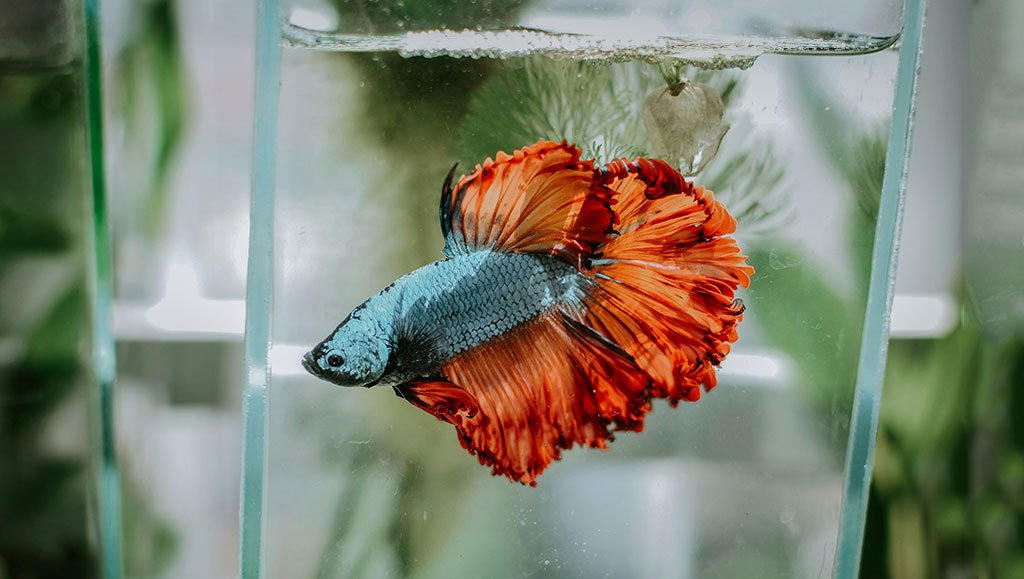
Benefits of Periodic Fasting for Betta Fish
Just as with humans, an occasional break from eating can be beneficial for digestion and overall health. It can help regulate a betta’s metabolism and aid in preventing health complications. Fasting can also help simulate their natural diet, where food may not always be readily available.
How to Implement Temporary Fasting
Aim for a fasting period of 1-2 days once or twice a week. Some aquarists follow a “5/2” schedule, where the betta is fed five days and fasted two days. Adjustments can be made based on the betta’s response and overall health.
Monitoring Your Betta’s Condition During Fasting
While fasting, it’s essential to monitor your betta for any signs of malnutrition or distress. Pay close attention to their behavior and appearance, and make adjustments if necessary. If you notice significant changes, such as excessive weight loss or lethargy, it’s crucial to resume regular feeding and seek guidance from a veterinarian if needed.
How to Safely Implement Fasting Periods
Begin with a ‘fast day’ once a week and monitor your betta’s health and behavior to see how they respond. Increase or decrease the fasting frequency based on their individual needs.
Monitoring Betta Fish’s Health During Fasting
Bettas should act normally during fasting days. If their behavior changes significantly or they show signs of distress, it could mean that weekly fasting is too much for them.
Conclusion
Understanding how long can a betta fish live without food involves recognizing the complex interplay of biological, environmental, and dietary factors that shape their needs. By tailoring your feeding schedule to your betta’s specific requirements and avoiding the pitfall of misinformation, you can ensure a healthy and thriving fish. Take the time to observe your betta’s behavior and adapt as needed, and remember, responsible feeding practices are a foundational element of good fishkeeping. If in doubt, consult with aquatic experts to provide the best care for your aquatic companion.
